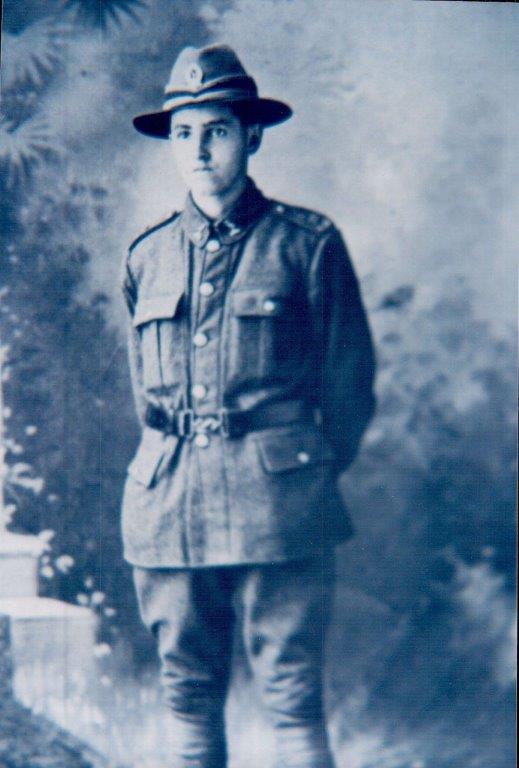Pte
Francis Estcourt Liverton
Informations sur naissance
|
Date de naissance: 10/03/1900 |
|
Lieu de naissance: Dannevirke, Manawatu-Wanganui, New Zealand |
Informations générales
|
Profession: Employé des chemins de fer |
Informations service militaire
|
Pays: New Zealand |
|
Force armée: New Zealand Expeditionary Force |
|
Rang: Private |
|
Numéro de service: 39543 |
|
Incorporation date: 14/10/1916 |
|
Incorporation nom de lieu: Ohakune, Manawatu-Wanganui, New Zealand |
|
Unités: — Otago Regiment, 3rd Bn. (Dernière unité connue) |
Informations sur décès
|
Date de décès: 23/11/1917 |
|
Lieu de décès: Bois du Polygone, Zonnebeke, Belgique |
|
Cause du décès: Killed in action (K.I.A.) |
|
Âge: 17 |
Cimetière
|
Buttes New British Cemetery, Polygon Wood Parcelle: I Rangée: A Tombe: 13 |
Distinctions et médailles 2
|
British War Medal Médaille |
|
Victory Medal Médaille |
Points d'intérêt 3
| #1 | Lieu de naissance | ||
| #2 | Lieu d'enrôlement | ||
| #3 | Lieu du décès (approximatif) |
Mon histoire
Francis Estcourt Liverton served in the 10th Company of the Otago Regiment 3rd Battalion, part of the 4th New Zealand Brigade, of the New Zealand Division. Francis was only 17 when he was killed in Flanders Fields. He lied about his age to enlist in the army, stating he was a railway clerk born on 19 October 1896, while he was in fact born on 10 March 1900. Notwithstanding being a minor, Francis was taken on and embarked for the Western front.
On the night of November 14th-15th men of the New Zealand Division relieved the 21st Division in the frontlines. Their sector extended from the Reutelbeek on the right to Noordemdhoek on the left, just East of Polygon Wood. The 4th New Zealand Brigade relieved the 21st Battalion in the left sub-sector. On 21 November 1917 the Otago Regiment 3rd Battalion moved into the line, on the right flank of the Brigade. The 4th and 8th Companies held the frontline, while the 10th Company remained in support; the 14th Company was held in reserve for counter-attacking purposes. Heavy rain fell all night and considerable work was required to effect drainage of the trenches.
There was intermittent German shelling throughout the 22nd and the 23rd of November. On the 23rd the New Zealand artillery carried out a test barrage on the German lines. The barrage was followed by harassing fire. The German artillery consequently responded by shelling the back areas.
Private Francis Estcourt Liverton was killed in action on the 23rd of November 1917. It’s highly likely he fell due to the German shelling on the back areas, as the 10th Company was in support behind the frontline. Francis Estcourt Liverton was buried near the Butte in Polygon Wood. His remains were reinterred in Buttes New British Cemetery, Polygon Wood, after the war.
On the night of November 14th-15th men of the New Zealand Division relieved the 21st Division in the frontlines. Their sector extended from the Reutelbeek on the right to Noordemdhoek on the left, just East of Polygon Wood. The 4th New Zealand Brigade relieved the 21st Battalion in the left sub-sector. On 21 November 1917 the Otago Regiment 3rd Battalion moved into the line, on the right flank of the Brigade. The 4th and 8th Companies held the frontline, while the 10th Company remained in support; the 14th Company was held in reserve for counter-attacking purposes. Heavy rain fell all night and considerable work was required to effect drainage of the trenches.
There was intermittent German shelling throughout the 22nd and the 23rd of November. On the 23rd the New Zealand artillery carried out a test barrage on the German lines. The barrage was followed by harassing fire. The German artillery consequently responded by shelling the back areas.
Private Francis Estcourt Liverton was killed in action on the 23rd of November 1917. It’s highly likely he fell due to the German shelling on the back areas, as the 10th Company was in support behind the frontline. Francis Estcourt Liverton was buried near the Butte in Polygon Wood. His remains were reinterred in Buttes New British Cemetery, Polygon Wood, after the war.
Sources 1
|
Byrne A.E., The Official History of the Otago Regiment, N.Z.E.F. in the Great War 1914-1918, (Dunedin, Wilkie & Co, Ltd, 1921), pg. 260-261. Sources utilisées |
Complément d’informations 5
|
Commonwealth War Graves Commission Database https://www.cwgc.org/find-records/find-war-dead/casualty-details/480337 |
|
Namenlijst (In Flanders Fields Museum) https://namenlijst.org/publicsearch/#/person/_id=1067e043-dae7-45bd-895d-3862c4455202 |
|
Lives of the First World War (Imperial War Museum) https://livesofthefirstworldwar.iwm.org.uk/lifestory/7178231 |
|
Online Cenotaph (Auckland Museum) https://www.aucklandmuseum.com/war-memorial/online-cenotaph/record/c8848 |
|
The NZEF Project (UNSW Canberra) https://nzef.adfa.edu.au/showPerson?pid=149148 |
